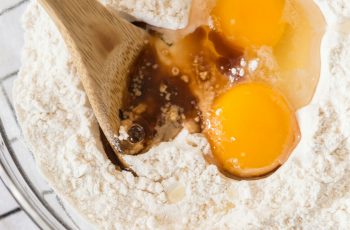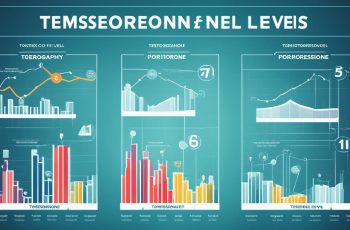Ad Blocker Detected
Our website is made possible by displaying online advertisements to our visitors. Please consider supporting us by disabling your ad blocker.
Testosterone is a steroid hormone that plays a crucial role in various aspects of health, including sexual function, muscle development, and disease risk. It is mostly produced in the testicles and ovaries, with smaller amounts produced by the adrenal glands. Maintaining optimal testosterone levels is important for both males and females throughout adulthood. Increasing testosterone levels naturally can have numerous benefits, such as improved muscle mass and strength. This article will provide evidence-based tips on how to naturally increase your testosterone levels.
Key Takeaways:
- Regular exercise, particularly weightlifting and resistance training, can significantly boost testosterone levels.
- A balanced diet, rich in protein and healthy fats, can support healthy testosterone production.
- Implementing stress management techniques, such as regular exercise and relaxation practices, can help maintain optimal testosterone levels.
- Vitamin D supplementation and avoiding hormone disruptors can further support healthy testosterone production.
- Prioritizing sufficient sleep and rest is crucial for maintaining optimal testosterone levels.
Exercise and Weightlifting
Regular exercise, particularly weightlifting and resistance training, has been shown to be highly effective in increasing testosterone levels. A 2015 study found that increased physical activity was more beneficial for boosting testosterone levels in men with obesity than calorie restriction alone. Weightlifting and high-intensity interval training (HIIT) have been found to be particularly effective in boosting testosterone levels. Engaging in regular exercise, including a combination of cardio and strength training, can help increase your testosterone levels naturally.
Weightlifting and resistance training are especially effective for boosting testosterone levels. These exercises involve using your muscles against a resistance, such as weights or resistance bands, to build strength and increase muscle mass. When you engage in weightlifting or resistance training, your body responds by producing more testosterone to support muscle growth and repair.
Weightlifting and resistance training involve using your muscles against a resistance to build strength and increase muscle mass.
Additionally, high-intensity interval training (HIIT) can also help increase testosterone levels. HIIT involves alternating periods of intense exercise with short rest periods. This type of training has been shown to stimulate the release of growth hormone, which can have a positive impact on testosterone production.
It’s important to note that while exercise can help boost testosterone levels, it is not a quick fix. Consistency is key, and it may take several weeks or months of regular exercise before you start noticing significant changes in your testosterone levels.
Dietary Considerations
Your diet plays a crucial role in maintaining healthy testosterone levels. Consuming adequate amounts of protein, fat, and carbohydrates is important for supporting testosterone production.
Protein-rich foods, such as lean meats, fish, eggs, and tofu, can help maintain healthy testosterone levels. These foods are packed with essential amino acids that are necessary for the production of testosterone. Aim to include a variety of protein sources in your diet to optimize testosterone levels.
Healthy fats, found in avocados, nuts, and olive oil, are also beneficial for testosterone production. These fats provide the building blocks for hormone production and help regulate cholesterol levels, which is important for testosterone synthesis.
Avoid refined carbohydrates and opt for whole foods instead. Refined carbohydrates, such as white bread and sugary snacks, can lead to insulin resistance and contribute to low testosterone levels. Focus on consuming complex carbohydrates from sources like fruits, vegetables, and whole grains, which provide essential nutrients and promote overall health.
To help you optimize your testosterone levels through diet, here’s a table that highlights some key foods to consider:
| Food | Testosterone-Boosting Benefits |
|---|---|
| Lean Meats (Chicken, Turkey, Beef) | High-quality protein and essential amino acids for testosterone production |
| Fatty Fish (Salmon, Tuna) | Rich in omega-3 fatty acids and vitamin D, which support testosterone levels |
| Eggs | High in protein, cholesterol, and nutrients important for testosterone synthesis |
| Tofu | A plant-based protein source that provides essential amino acids for testosterone production |
| Avocados | Rich in healthy fats that support hormone production |
| Nuts (Almonds, Walnuts) | Contain healthy fats, protein, and essential nutrients for testosterone synthesis |
| Olive Oil | Provides monounsaturated fats, which promote testosterone production |
By incorporating these testosterone-boosting foods into your diet and avoiding refined carbohydrates, you can optimize your testosterone levels naturally and support overall health.

Stress Management
Chronic stress and elevated cortisol levels can have a negative impact on testosterone levels, leading to various health issues. Increased cortisol production can reduce testosterone production, causing a hormonal imbalance in the body. To promote healthy testosterone levels, it is essential to implement effective stress management techniques.
One of the most effective ways to manage stress and boost testosterone levels is through regular exercise. Engaging in physical activity releases endorphins, which are natural stress-fighting hormones. Exercise also helps reduce cortisol levels, allowing for the optimal production of testosterone. Incorporating activities such as cardio workouts, weightlifting, and yoga into your routine can be highly beneficial for managing stress and supporting healthy testosterone levels.
Sufficient sleep and relaxation practices are also important for stress management and testosterone production. Lack of sleep and high stress levels can disrupt the delicate hormonal balance in the body, leading to decreased testosterone levels. Aim for 7-8 hours of quality sleep each night to promote healthy testosterone production and overall well-being. Additionally, incorporating relaxation techniques such as deep breathing exercises, meditation, or spending time in nature can help reduce stress and promote hormonal balance.
“Stress can have a significant impact on hormone levels, including testosterone. By implementing stress management techniques, you can minimize the negative effects of stress and promote healthy testosterone production.”
Managing stress effectively is crucial for overall health and well-being, including testosterone production. By incorporating regular exercise, sufficient sleep, and relaxation practices into your daily routine, you can minimize the negative effects of stress and boost your testosterone levels naturally.

| Stress Management Techniques | Benefits |
|---|---|
| Regular exercise | – Releases endorphins – Reduces cortisol levels – Promotes optimal testosterone production |
| Sufficient sleep | – Supports healthy testosterone levels – Promotes hormonal balance |
| Relaxation practices | – Reduces stress levels – Promotes hormonal balance – Enhances overall well-being |
Vitamin D and Supplements
Vitamin D is an important micronutrient that has been linked to testosterone levels. Low levels of vitamin D may be associated with decreased testosterone levels. Taking a vitamin D supplement or getting regular exposure to sunlight can help maintain healthy levels of vitamin D and potentially improve testosterone levels. Additionally, certain supplements, such as zinc, have been found to support healthy testosterone levels. It is important to consult with a healthcare professional before starting any supplementation regimen.
One study found that men who received vitamin D supplements experienced a significant increase in testosterone levels compared to those who received a placebo. Another study showed that men who were deficient in vitamin D increased their testosterone levels after taking supplements for one year.
To ensure you get enough vitamin D, consider including foods rich in this nutrient in your diet, such as fatty fish (salmon, mackerel), fortified dairy products, and egg yolks. Additionally, spending time outdoors and exposing your skin to sunlight can naturally boost your vitamin D levels.
Supplements can be a convenient way to support your vitamin D intake, especially if you have limited sun exposure or a vitamin D deficiency. However, it is important to consult with a healthcare professional before starting any supplementation, as they can help determine the appropriate dosage for your specific needs.
| Supplement | Benefits |
|---|---|
| Vitamin D | Increase testosterone levels Support bone health |
| Zinc | Support healthy testosterone levels Boost immune function |
| Magnesium | Improve testosterone levels Promote muscle relaxation |
Sleep and Rest
Sufficient, high-quality sleep is essential for maintaining optimal testosterone levels. Lack of sleep or poor sleep quality can negatively affect testosterone production. Getting at least 7-8 hours of sleep per night is recommended to support healthy testosterone levels. It is important to prioritize adequate rest and establish a consistent sleep schedule to optimize testosterone production naturally.
The Importance of Sleep for Testosterone Levels
Adequate sleep plays a crucial role in optimizing testosterone levels. During sleep, the body goes through various restorative processes, including hormone regulation. Lack of sleep disrupts this delicate balance and can lead to decreased testosterone production. Research studies have shown that sleep deprivation can result in reduced testosterone levels, affecting overall health and vitality.
Optimizing testosterone levels through sleep goes beyond just the duration of sleep. It also involves ensuring high sleep quality. Factors such as a comfortable sleeping environment, a regular sleep schedule, and minimizing disruptions can contribute to better sleep quality and, consequently, improved testosterone production.
The Recommended Sleep Duration
It is recommended to aim for 7-8 hours of sleep per night to support healthy testosterone levels. This duration allows the body to go through the appropriate sleep cycles, including deep sleep and rapid eye movement (REM) sleep, which are essential for hormone regulation and overall restfulness.
In addition to the duration, the timing of sleep is also important. Consistently going to bed and waking up at the same time every day can help regulate the body’s internal clock, signaling the production of hormones, including testosterone, at the appropriate times.
Tips for Optimizing Sleep and Testosterone Production
Here are some tips to help you optimize your sleep and promote healthy testosterone production:
- Create a relaxing bedtime routine to signal to your body that it’s time to wind down.
- Create a comfortable sleep environment with a cool, quiet, and dark bedroom.
- Avoid electronic devices before bed, as the blue light emitted can interfere with sleep.
- Avoid caffeine and stimulating substances close to bedtime.
By prioritizing sleep and rest, you can take a proactive approach to optimizing your testosterone levels naturally.
“Proper sleep is more than just a necessity; it is a vital component of overall health and well-being.” – Sleep Expert

| Benefits of Sufficient Sleep and Rest for Testosterone Production | Consequences of Sleep Deprivation on Testosterone Levels |
|---|---|
| 1. Enhanced testosterone synthesis | 1. Decreased testosterone levels |
| 2. Improved muscle mass and strength | 2. Reduced muscle development and strength |
| 3. Increased energy levels | 3. Fatigue and decreased energy |
| 4. Enhanced libido and sexual function | 4. Decreased sexual desire and performance |
| 5. Overall improved mood and well-being | 5. Increased risk of mood disorders |
Avoiding Hormone Disruptors
When it comes to maintaining healthy testosterone levels, it’s important to be mindful of potential hormone disruptors in our environment. Certain chemicals, such as bisphenol-A (BPA) found in some types of plastic, can mimic estrogen and interfere with hormone balance, including testosterone production.
By making simple lifestyle changes, you can minimize your exposure to these hormone disruptors and support optimal testosterone production. Here are some steps you can take:
- Opt for BPA-free products: Choose food containers, water bottles, and cookware that are labeled BPA-free. These alternatives are made with materials that are less likely to leach harmful chemicals into your food and drink.
- Avoid plastic wrap and containers: When storing leftovers, consider using glass or ceramic containers instead of plastic. Additionally, opt for wax paper or aluminum foil instead of plastic wrap.
- Choose organic produce: Pesticides used in conventional farming can contain hormone-disrupting chemicals. By opting for organic fruits and vegetables, you can minimize your exposure to these harmful substances.
- Reduce processed food consumption: Processed foods often contain additives and preservatives that may disrupt hormonal balance. Opt for whole, unprocessed foods as much as possible.
- Be cautious with personal care products: Many personal care products, such as shampoos, soaps, and cosmetics, may contain chemicals that can disrupt hormones. Look for products that are labeled “paraben-free” and “phthalate-free” to minimize your exposure.
By incorporating these lifestyle changes, you can minimize your exposure to hormone disruptors and support the natural production of testosterone in your body.
Remember, small changes can make a big difference in optimizing your testosterone levels and promoting overall hormonal balance.

Conclusion
Maintaining optimal testosterone levels is crucial for your overall health and well-being. By incorporating evidence-based strategies such as regular exercise, a balanced diet, stress management techniques, and sufficient sleep, you can naturally increase your testosterone levels. These lifestyle changes can have a positive impact on your testosterone production and promote overall health.
Engaging in regular exercise, especially weightlifting and resistance training, has been shown to be highly effective in boosting testosterone levels. Combine cardiovascular workouts with strength training for the best results. Remember to consult with a healthcare professional before starting any new exercise regimen.
Your diet also plays a significant role in optimizing testosterone levels. Consume a well-rounded diet consisting of lean proteins, healthy fats, and whole foods. Incorporate foods such as lean meats, fish, eggs, tofu, avocados, nuts, and olive oil into your meals. Minimize intake of refined carbohydrates, as they can negatively affect testosterone production.
Additionally, managing stress effectively and getting sufficient sleep are essential for maintaining healthy testosterone levels. Implement stress management techniques like regular exercise, sufficient sleep, and relaxation practices into your daily routine. Aim for 7-8 hours of high-quality sleep per night to support your testosterone production naturally.
Consider incorporating vitamin D supplementation, with guidance from a healthcare professional, to support healthy testosterone levels. Also, be mindful of hormone disruptors in your environment. Reduce exposure to chemicals like bisphenol-A (BPA) by using BPA-free products and making other lifestyle changes that minimize exposure to potential disruptors.
By prioritizing these natural ways to boost testosterone and optimizing your testosterone levels, you can improve your overall health and well-being. Take control of your health today and enjoy the benefits of healthy testosterone levels.
FAQ
How can I naturally increase my testosterone levels?
There are several ways you can naturally increase your testosterone levels. Regular exercise, including weightlifting and resistance training, has been shown to be highly effective in boosting testosterone levels. Additionally, consuming a well-rounded diet that includes protein-rich foods and healthy fats can support testosterone production. Stress management techniques, such as exercise and sufficient sleep, can also help maintain healthy testosterone levels. Lastly, considering vitamin D supplementation and minimizing exposure to hormone disruptors can further support optimal testosterone production.
What types of exercises can help boost testosterone levels?
Weightlifting and high-intensity interval training (HIIT) have been found to be particularly effective in increasing testosterone levels. Engaging in regular exercise that includes a combination of cardio and strength training can also help boost testosterone naturally.
Are there any foods that can increase testosterone levels?
Yes, certain foods can help increase testosterone levels naturally. Foods rich in protein, such as lean meats, fish, eggs, and tofu, can support healthy testosterone production. Consuming healthy fats found in avocados, nuts, and olive oil can also be beneficial for testosterone levels. It’s important to maintain a well-rounded diet consisting of whole foods to optimize testosterone levels.
How does stress management affect testosterone levels?
Chronic stress and elevated cortisol levels can negatively impact testosterone production. Implementing stress management techniques, such as regular exercise, sufficient sleep, and relaxation practices, can help minimize stress and promote healthy testosterone levels.
Can vitamin D and supplements help improve testosterone levels?
Yes, vitamin D is an important micronutrient that has been linked to testosterone levels. Low levels of vitamin D may be associated with decreased testosterone levels. Taking a vitamin D supplement or getting regular exposure to sunlight can help maintain healthy levels of vitamin D and potentially improve testosterone levels. Additionally, certain supplements like zinc have been found to support healthy testosterone levels. It’s important to consult with a healthcare professional before starting any supplementation regimen.
How does sleep affect testosterone production?
Sufficient, high-quality sleep is essential for maintaining optimal testosterone levels. Lack of sleep or poor sleep quality can negatively affect testosterone production. Getting at least 7-8 hours of sleep per night is recommended to support healthy testosterone levels. Prioritizing adequate rest and establishing a consistent sleep schedule can help optimize testosterone production naturally.
Can exposure to hormone disruptors affect testosterone levels?
Yes, several factors in our environment can disrupt hormone levels, including testosterone. Limiting exposure to estrogen-like chemicals, such as bisphenol-A (BPA) found in some types of plastic, can help maintain healthy testosterone levels. Incorporating lifestyle changes, such as using BPA-free products and reducing exposure to other potential hormone disruptors, can contribute to overall hormonal balance and support optimal testosterone production.
How important is it to maintain optimal testosterone levels?
Maintaining optimal testosterone levels is crucial for overall health and well-being. Testosterone plays a vital role in various aspects of health, including sexual function, muscle development, and disease risk. By incorporating evidence-based strategies such as regular exercise, a balanced diet, stress management techniques, and sufficient sleep, you can naturally increase your testosterone levels and promote overall health.
Can Improving Your Testosterone Levels Also Boost Your Energy?
Yes, boosting energy with testosterone supplements can have a positive impact on your energy levels. Higher testosterone levels can lead to increased energy, stamina, and physical performance. This can be especially beneficial for those experiencing low energy or fatigue due to low testosterone levels.
Can Taking Vitamins Help Improve Testosterone Levels as Mentioned in the Article?
According to the article, boosting testosterone with vitamins could potentially help improve testosterone levels. However, it’s important to consult with a healthcare professional before taking any supplements, as individual results may vary. Additionally, maintaining a balanced diet and regular exercise are also key factors in maintaining healthy testosterone levels.


